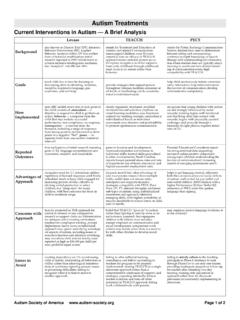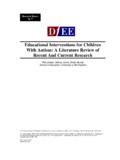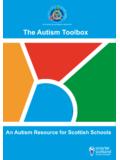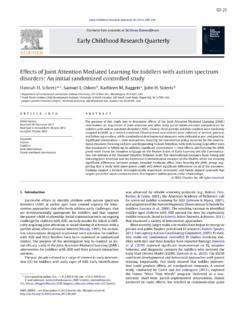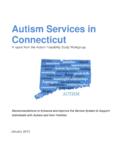Transcription of Education and Training in Developmental Disabilities
1 Education andTraininginDevelopmentalDisabilitiesFo cusing on individuals withcognitive Disabilities /mental retardation, autism , and related disabilitiesVolume 40 Number 4 December 2005 December 2005 Education and Training in Developmental DisabilitiesVol. 40, No. 4, pp. 333 428 Education and Training in Developmental DisabilitiesThe Journal of the Division on Developmental Disabilities ,The Council for Exceptional ChildrenEditor:Stanley H. ZuckerArizona State UniversityEditorial Assistant:Amy BarryArizona State UniversityConsulting EditorsMartin AgranReuben AltmanRichard BartlettPhillip J. BelfioreSharon Borthwick-DuffyMichael P. BradyFredda BrownMary Lynne CalhounCaroline DunnLise FoxDavid L. GastHerbert GoldsteinRobert HendersonCarolyn HughesLarry K. IrvinJames V. KahnH. Earle KnowltonBarry W. LavayRena LewisKathleen J.
2 MarshallJohn McDonnellGale M. MorrisonGabriel A. NardiJohn NietupskiJames R. PattonEdward A. PollowayThomas G. RobertsRobert S. RuedaDiane L. RyndakEdward J. SabornieLaurence R. SargentGary M. SassoTom E. C. SmithScott SparksFred SpoonerRobert StoddenKeith StoreyDavid L. WestlingJohn J. WheelerMark WoleryEducation and Training in Developmental Disabilitiesis sent to all members of the Division on Developmental Disabilities of The Councilfor Exceptional Children. All Division members must first be members of The Council for Exceptional Children. Division membership duesare $ for regular members and $ for full time students. Membership is on a yearly basis. All inquiries concerning membership,subscription, advertising, etc. should be sent to the Division on Developmental Disabilities , 1110 North Glebe Road, Arlington, VA rates are available upon should be typed, double spaced, and sent (five copies) to the Editor: Stanley H.
3 Zucker, Special Education Program, Box872011, Arizona State University, Tempe, AZ 85287-2011. Each manuscript should have a cover sheet that gives the names, affiliations, andcomplete addresses of all policies are based on thePublication Manual,the American Psychological Association, 2001 information isprovided on the inside back signed article is the personal expression of the author; likewise, any advertisement is the responsibilityof the advertiser. Neither necessarily carries Division endorsement unless specifically set forth by adopted and Training in Developmental Disabilitiesis abstracted and indexed inPsychological Abstracts, PsycINFO, e-psyche, Abstractsfor Social Workers, International Journal of Rehabilitation Research, Current Contents/Social and Behavioral Sciences, Excerpta Medica,Social Sciences Citation Index, Adolescent Mental Health Abstracts, Educational Administration Abstracts, Educational Research Abstracts,andLanguage and Language Behavior , it is annotated and indexed by the ERIC Clearinghouse on Handicapped andGifted Children for publication in the monthly print indexCurrent Index to Journals in Educationand the quarterly index,Exceptional ChildEducation and Training in Developmental DisabilitiesVol.
4 40, No. 4, December 2005, Copyright 2005 by the Division on DevelopmentalDisabilities, The Council for Exceptional on Developmental DisabilitiesThe Council for Exceptional ChildrenBoard of DirectorsOfficersPast PresidentBarbara GartinPresidentDagny FidlerPresident-ElectPhil ParetteVice PresidentBrenda MylesSecretaryCindy PerrasTreasurerAmanda BoutotMembersJoyce AgnessLeslie BrounJim ForristalKent GerlachKara Hume (Student Governor)Nikki MurdickExecutive DirectorTom E. C. SmithPublications ChairJack HourcadeThe purposes of this organization shall be to advance the Education and welfare of persons with Developmental Disabilities , research in theeducation of persons with Developmental Disabilities , competency of educators in this field, public understanding of Developmental Disabilities ,and legislation needed to help accomplish these goals.
5 The Division shall encourage and promote professional growth, research, and thedissemination and utilization of research AND Training IN Developmental Disabilities (ISSN 1547-0350) (USPS 0168-5000) is published quarterly inMarch, June, September, and December, by The Council for Exceptional Children, Division on Developmental Disabilities , 1110 NorthGlebe Road, Arlington, Virginia 22201-5704. Members dues to The Council for Exceptional Children Division on DevelopmentalDisabilities include $ for subscription to Education AND Training IN Developmental Disabilities . Subscription toEDUCATION AND Training IN Developmental Disabilities is available without membership; Individual $ peryear; Canada, PUAS, and all other countries $ ; Institutions $ per year; Canada, PUAS, and all other countries $ ;single copy price is $ Periodicals postage is paid at Arlington, Virginia 22204 and additional mailing : Send address changes to Education AND Training IN Developmental Disabilities , 1110 North GlebeRoad, Arlington, Virginia and Training in DevelopmentalDisabilitiesEditorial PolicyEducation and Training in Developmental Disabilitiesfocuses on the Education andwelfare of persons with Developmental research andexpository manuscripts and critical review of the literature.
6 Major emphasis is onidentification and assessment, educational programming, characteristics, trainingof instructional personnel, habilitation, prevention, community understanding andprovisions, and manuscript is evaluated anonymously by three reviewers. Criteria for ac-ceptance include the following: relevance, reader interest, quality, applicability,contribution to the field, and economy and smoothness of expression. The reviewprocess requires two to four expressed are those of the authors and do not necessarily conform topositions of the editors or of the officers of the of Manuscripts1. Manuscript submission is a representation that the manuscript is the author sown work, has not been published, and is not currently under consideration forpublication Manuscripts must be prepared according to the recommendations in thePub-lication Manual of the American Psychological Association(Fifth Edition, 2001).
7 Standard typewriter type, laser, or high density dot printing are Each manuscript must have a cover sheet giving the names and affiliations of allauthors and the address of the principal Graphs and figures should be originals or sharp, high quality photographicprints suitable, if necessary, for a 50% reduction in Five copies of the manuscript along with a transmittal letter should be sent to theEditor: Stanley H. Zucker, Special Education Program, Box 872011, ArizonaState University, Tempe, AZ Upon receipt, each manuscript will be screened by the editor. Appropriatemanuscripts will then be sent to consulting editors. Principal authors will receivenotification of receipt of The Editor reserves the right to make minor editorial changes which do notmaterially affect the meaning of the Manuscripts are the property ofETDDfor a minimum period of six months.
8 Allarticles accepted for publication are copyrighted in the name of the Division onDevelopmental Behavior and Functional Analysis: Ethics and Evidence335 RICHARD P. HASTINGSSTEPHEN J. NOONER eview of Assessment Procedures for Students with Moderate andSevere Disabilities343 ELLIN SIEGELROSE M. ALLINDERA ttitudes of Japanese Adults Toward Persons with Intellectual Disability:An Exploratory Analysis of Respondents Experiences and Opinions352 TOSHIAKI TACHIBANAT eachers View of Transition Services: Results from a Statewide Survey inSouth Carolina360 DALUN ZHANGJOY IVESTERANTONIS KATSIYANNISU sing Self Evaluation to Improve Student Teacher Interns Use ofSpecific Praise368 CASSANDRA L. KELLERMICHAEL P. BRADYRONALD L. TAYLORS electing and Validating Tasks from a Kindergarten Screening Battery ThatBest Predict Third Grade Educational Placement377 MARCIA STRONG SCOTTCHRISTINE F.
9 DELGADOSHIHFEN TUKATHRYN L. FLETCHERE ffectiveness of Constant Time Delay on Teaching Snack and DrinkPreparation Skills to Children with Mental Retardation390 FUNDA BOZKURTOGUZ GURSELT eaching Naming Relatives to Individuals with autism UsingSimultaneous Prompting401 NURGUL AKMANOGLU-ULUDAGSEMA BATUE ducation and Training in Developmental DisabilitiesVOLUME 40 NUMBER 4 DECEMBER 2005 The Division on Developmental Disabilities retains literary property rights on copyrighted articles. Up to 100copies of the articles in this journal may be reproduced for nonprofit distribution without permission from thepublisher. All other forms of reproduction require permission from the Teacher Performance Rate and Accuracy Scale (TPRA): Training as Evaluation411 DENISE E ROSSJESSICA SINGER-DUDEKR. DOUGLAS GREERI ndex Volume 40, 2005424 Manuscripts Accepted for Future Publication in Education and Training inDevelopmental Disabilities334 Manuscripts Accepted for Future Publication in Educationand Training in Developmental DisabilitiesMarch 2006 Attitudes of Japanese adults towards persons with intellectual disability: Effect of perceptionsconcerning intellectual disabilityToshiaki Tachibana,Department of Social Welfare, Aichi Shin-shiro Otani University, Kawaji, Shinshiro, Aichi 441-1306 between video CD-ROM and community-based job preferences for individualswith Developmental Disabilities .
10 David A. Ellerd,Robert Morgan,and Charles L. Salzberg, UtahState University, 2865 Old Main, Logan, UT them happy: Job satisfaction, personality, and attitudes toward disability in predictingcounselor job retention. Emily R. Lawrence,Laraine Glidden,and Brian M. Jobe, St. Mary sCollege of Maryland, 18952 East Fisher Road, St. Mary s City, MD and passive task related behavior, direction following and the inclusion of children Kempand Mark Carter, Macquarie University Special Education Centre, Mac-quarie University, Sydney, 2109 self-determination into 18-21 services for students with intellectual or developmentaldisabilities: A multi-stage, multiple component L. Wehmeyer,Nancy Garner,Danna Yeager, Margaret Lawrence, and Anna Kay Davis, University of Kansas, Haworth Hall, 1200 Sunnyside Ave.
